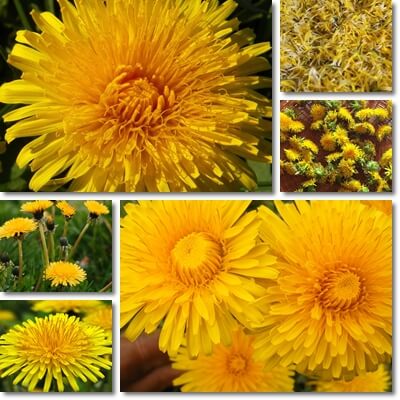Dandelion flowers are one of the most readily accessible edible flowers, and a plentiful source of edible forage material. Not just this, but dandelion flowers also possess scientifically proven therapeutic activities, providing an interesting array of medicinal benefits. If you have been including dandelion flowers in your diet, or have been hesitant to do so not knowing their health effects, then you will be surprised to learn just how good they are for you.
What are the benefits of dandelion flowers?
Dandelion flowers are low in calories and good for weight loss diets. The bright yellow color of the flower heads is indicative of the presence of bioactive pigmented antioxidants such as the xanthophylls lutein and zeaxanthin. Eating dandelion flowers provides fiber to the diet for regular transit and good digestive health, as well as antioxidants with benefits for eyesight. Studies also show dandelion flower water extracts exert a protective effect on the skin, helping absorb UVB radiation from sunlight and protecting against skin damage, with antiaging benefits.

1) Low in calories and fat, perfect for weight loss diets
If you are looking to lose weight, you may consider dandelion flowers, and dandelion greens, to seriously cut back on your daily intake of calories and create a calorie deficit that is conducive to weight loss.
Dandelion flowers, and leaves, are low in calories with around 40-50 kilocalories per 100 grams of raw flowers and greens, and have less than 1 gram of fat.
You can enjoy dandelions raw in a salad made from young dandelion leaves, dandelion flower heads, fresh tomatoes, either red or orange or yellow tomatoes, seasonal pink radishes, seasoned with just 1 tablespoon of raw extravirgin olive oil, 1-2 tablespoons of raw lemon juice and salt. Alternatively, you can cook dandelions and consume them as a warm side dish next to a lean protein main option such as grilled chicken breast, without skin, or an egg white omelet.

2) Photoprotective effects with antiaging benefits for skin
Studies on the therapeutic properties of dandelion flowers reveal interesting results: water extracts of dandelion flowers exhibit photoprotective effects, with antiaging benefits.
More exactly, dandelion flower water extracts have been shown to protect human skin fibroblasts from UVB damage and subsequent cellular aging. Fibroblasts are cells that produce connective tissue such as collagen which is responsible for skin elasticity and essentially youthful skin.
Ultraviolet radiation from sunlight is a source of cell damage, generating reactive oxygen species called free radicals. Free radicals cause skin damage manifesting as wrinkles, discoloration and, long-term, increased susceptibility to cancer.
In a study, dandelion flower (and leaf) extract applied to the skin before and immediately after UVB irradiation inhibited pathways conducive to skin photo-ageing.
Moreover, the dandelion extract stimulated the production of glutathione, a peptide known to offer protection against oxidative processes, including cell aging oxidation-driven processes. Not just this, but the dandelion flower extract was also found to absorb UVB radiation when applied to the skin, further indicating a protective effect against sun skin damage and skin ageing.
3) Benefits for gut bacteria imbalance – help normalize gut bacteria populations
One of the benefits that dandelion flowers share with dandelion root is they help restore good gut bacteria populations and normalize the gut microbiome for better digestive health.
Gut bacteria imbalances can negatively impact general health, being a source of side effects for the digestive system, the immune system and the nervous system, to name a few.
Dandelion flowers can be consumed raw and provide dietary fiber that serves as a food source for good gut bacteria, nourishing existing populations and helping improve their numbers.
This benefits the gut environment, and a balanced and healthy gut medium is conducive to good general health.
Studies also show that gut bacteria imbalance brought on by chronic alcohol intake (alcoholism) can be at least partially remedied by consumption of water extracts from dandelion flowers (source). This presents dandelion flower water extracts as potential remedies for intestinal bacterial dysbiosis and bacterial overgrowth in the small intestines.
4) Hepato-protective effects – combat fatty liver due to alcoholism
Chronic alcohol intake causes the accumulation of fats in the liver, or fatty liver disease, formally called hepatic steatosis. In a study, white flower dandelion ( Taraxacum coreanum Nakai) water extract was shown to protect against ‘alcoholic liver steatosis by accelerating ethanol degradation’.
Moreover, water extracts of white dandelion and, by extension, potentially also yellow dandelion flowers, can help protect against ethanol-induced losses in lean body mass and bone mass, and improve glucose tolerance.
5) Anticoagulant effects with benefits for blood clotting
In a study, dandelion flower phenolic preparations at 50% and 85% concentration were shown to increase thrombin time, exerting an anti-platelet action and delivering anticoagulant effects (source).
This suggests that consumption of preparations from dandelion flowers, such as dandelion flower tea, dandelion petal extracts or dietary supplements, can potentially represent a source of anticlotting benefits to those with increased risks for blood clots.
Hydroxycinnamic acid and derivatives are the suspected biologically active components in dandelion flowers that increase blood clotting time and deliver anticlotting benefits.
6) Antioxidant action
Studies show dandelion flower extracts suppress both superoxide and hydroxyl radicals via antioxidants such as flavonoids, coumaric acid, and derivatives. Dandelion flower extracts were also shown to reduce production of nitric oxide, another free radical responsible for oxidative damage. The flower extracts have been observed to have marked antioxidant activity (source).
Dandelion flower water syrup made from flowers from the common dandelion (Taraxacum officinale) was also shown to improve antioxidant status by increasing plasma superoxide radical scavenging enzymes and decreasing lipid peroxidation (source).
Preparations from dandelion flowers were recognized as better sources of bioactive antioxidant compounds such as flavonoids (source), and likely to produce more potent antioxidant effects vs preparations from dandelion leaves or greens.
7) Benefits for vision – provide nutrition to advance eye health
The bright yellow color of dandelion flowers is indicative of the presence of pigmented carotenoid antioxidants, notably the yellow xanthophylls lutein and zeaxanthin. Studies show lutein and zeaxanthin get deposited in the retina and macula lutea areas of the human eye and account for up to 80% of all carotenoids in the eye.
These two antioxidant pigments protect and enhance vision, contributing to lower risks of age-related macular degeneration and even cataract (source). According to research, up to 32% lower prevalance of nuclear cataract was observed in women with the highest levels of serum lutein, plus zeaxanthin (study).
Of course, dandelion flowers are meant to be consumed in more limited amounts than regular culinary vegetables, so to get the bulk of your daily lutein requirements, it’s better to rely on bright yellow and orange fruits and vegetables such as yellow carrots and yellow watermelon.
8) Immunomodulating action – stimulate the immune system response
Eating dandelion flowers can trigger a significant immunological response in both individuals with a history of allergic reactions to dandelions, or other daisy family plants, and in individuals who are not allergic to dandelions, or other daisy family plants.
Pollen particles from the flower heads activate the immune system and induce clear immunological effects, modulating human immune cells and immune system responses, essentially stimulating the immune system function as a whole.
However, if you are allergic to dandelions or other daisy family plants (e.g. Jerusalem artichokes, globe artichokes, sunflowers, yarrow, endives and chicories), refrain from consuming dandelion flowers in all forms and preparations to avoid triggering an allergic reaction.
9) Dandelion flowers are anti-inflammatory
Biologically active components in dandelion flowers appear to suppress the production of prostaglandin E2 and nitric oxide, presumably by suppressing cyclooxygenase-2 (COX-2) and inducible nitric oxide synthetase (source), resulting in anti-inflammatory effects. Fresh dandelion flowers, water extracts and, to a lesser extent, preparations such as dandelion flower tea, macerations, poultices and more can provide varying degrees of anti-inflammatory benefits.
10) Increase the effectiveness of anti-inflammatory medication
Herbs are known for having varied therapeutic activities and represented the first form of medicine before the advent of modern medicine. By now it is well known that most herbs that are also medicinal plants to certain extents interact with conventional medication, either potentiating their effects, or reducing them.
Dandelion flowers and preparations from them can increase the effectiveness of anti-inflammatory medication, when taken together, and create a more potent anti-inflammatory effect. This effect is owed to bioactive components in dandelion flowers with hepato-modulating activities and anti-inflammatory activities such as luteolin and luteolin-7-O-gluccoside, among others.
11) Dandelion flower tea has diuretic and blood pressure lowering properties
Dandelion tea made from dandelion flowers is a natural diuretic, helping increase the elimination of urine and reducing water retention and associated swelling in the body. Drinking dandelion flower tea can help reduce swelling in legs such as swollen ankles and feet, swelling in the arms such as swollen hands, as well as abdominal swelling and face puffiness due to water retention.
The diuretic action of dandelion tea continues with modest blood pressure lowering benefits, helping normalize blood pressure numbers that are too high. The blood pressure lowering benefits of dandelion flower tea can be increased by concomitantly initiating a low-sodium diet.
